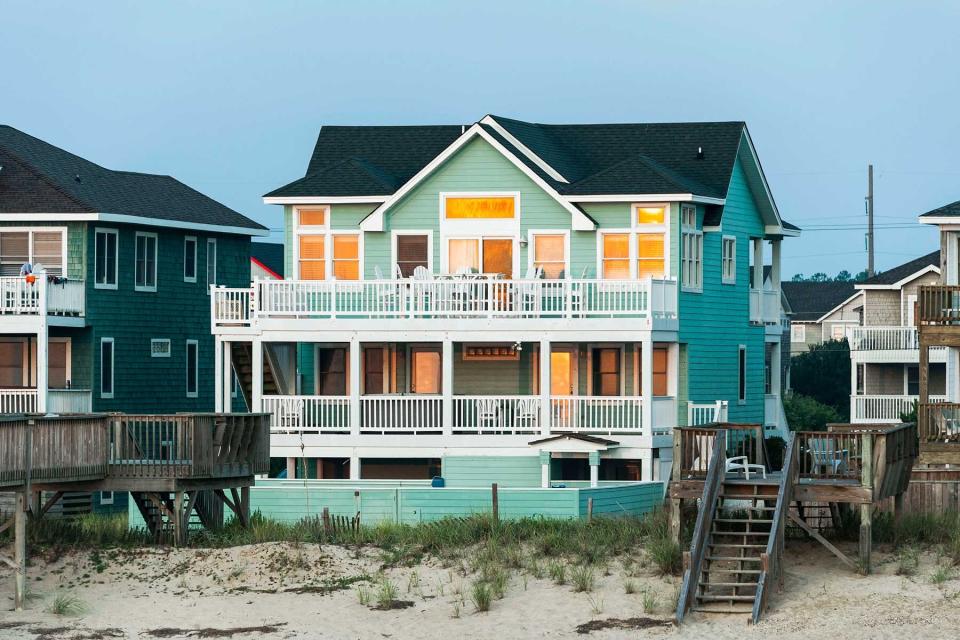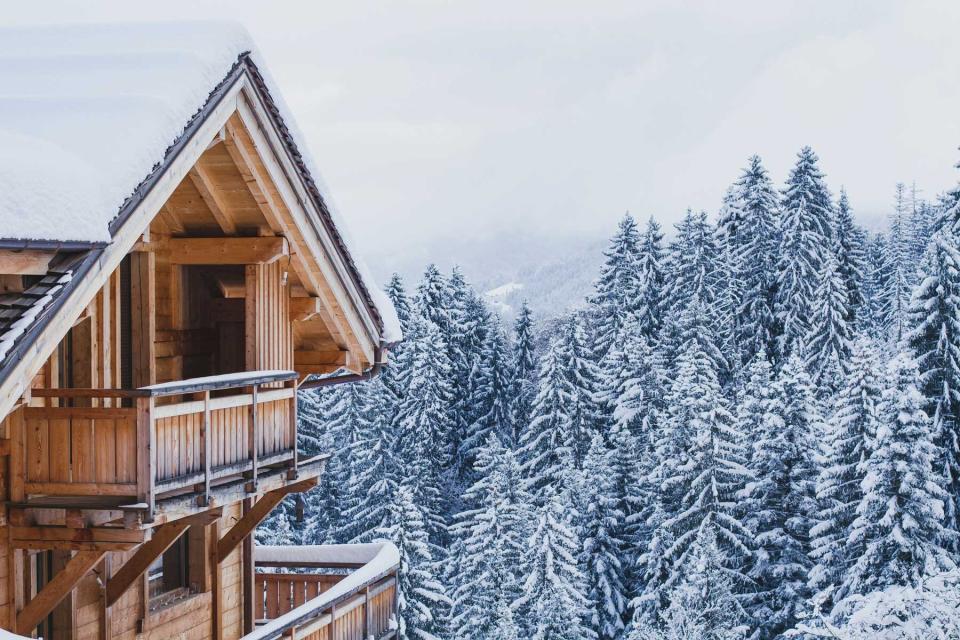12 Mistakes to Avoid When Renting a Vacation Home, According to Experts

As I neared the address of the Airbnb I booked, barred windows began appearing on the homes I passed. It was my first time booking a vacation rental on a solo trip, and I had turned down offers to stay at friends' homes because I was so mesmerized by the photos of this property I found in the Silver Lake neighborhood of Los Angeles.
I thought I had done my research, knowing it was a private room in a space with shared bathroom facilities — and a private bar. Paired with what I knew of the area from having lived in Los Angeles for seven years (albeit almost two decades ago), I didn't give a second thought to the exact block. After all, I was so fascinated by the funky interior decor, which felt one part old-school Victorian and one part mysterious Magic Castle (or at least what I imagined the inside of the illustrious nearby private club to look like), that I simply had to experience it.
As I stood with my palms sweating, waiting for the host to open the door of the withering nondescript building, I darted my eyes in every direction, while simultaneously trying to disguise the fact I was traveling alone — despite my obvious rolling suitcase.
Instead of being at a centrally located home base to enjoy the neighborhood restaurants and bars, I found myself needing to drive everywhere and then searching for parking in the dark streets before sprinting back to the building. The inside was lovely, but I'm not sure I fully exhaled until I drove away on the final day.
My next stop was Joshua Tree, where I booked an earth dome home — a sight in and of itself — and my only regret there was treating it like a crash pad instead of leaving more time to enjoy the ambiance of the Airbnb, which even had an inspiring studio workspace (where I'm sure I missed out on writing the next great American novel).

John Greim/LightRocket via Getty Images
As I discovered through this experience, vacation rental homes range widely, not just in facilities and location, but also host interactions and pricing. But one thing is for sure: There's no better way to immerse yourself in a community than by living in a private home there. So, I talked to vacation rental experts from Airbnb, Vrbo, TurnKey Vacation Rentals, and Booking.com for insight on how to avoid first-timer mistakes like my own and set equal expectations to create a more meaningful experience for both sides.
1. Misunderstanding the Location
"Location, location, location. Be sure to check the description of your vacation rental's location and how close it is to the attractions you want to experience," TJ Clark, TurnKey Vacation Rentals cofounder and president, tells Travel + Leisure. Since many rental platforms don't offer the exact address until you book for privacy purposes, be sure to inquire if you have specific expectations, Airbnb Superhost Jimmy Repp, says. "It's especially critical when you're in a beach location because that could be the difference of being beachfront or closer to the freeway," he says, adding that it may be helpful to pinpoint the location with hosts by using local landmarks, like a grocery store or restaurant.
Related: 10 Amazing Airbnb Rentals Near National Parks
2. Judging a Place by Photos Alone
Just like not judging a book by its cover, don't judge a rental by its photos. "Though it may be tempting to book based on the photos alone, take the extra time to read through everything the vacation home has to offer," Vrbo spokesperson Alison Kwong tells T+L. "It can help manage expectations and inform your decision before booking." Repp adds that sometimes the initial photos that draw you in might not be, say, the view from the room, but may be of the local area. "I wouldn't say you can't trust the photos, but just do a little extra homework and ask some questions," he says.

Getty Images
Related: These Were Airbnb's Most-liked Rentals on Instagram Last Summer
3. Not Using a Major Platform
While there is a wide range of vacation rental services, Clark advises sticking to ones with a solid track record. "There have been many cases of vacation rental fraud and scams happening on sites like Craigslist and other community-driven forums," he says. "Look for the site of a trusted property management company, or established travel sites with a process for verifying homes and hosts, like Airbnb, Vrbo, Homes & Villas by Marriott International, and other reliable platforms." He also says that requests for money transfers are a red flag and advises using credit card payments as the safest option.
4. Not Looking at Recent Reviews
Most platforms have two-way reviews, with guests reviewing their stays and hosts reviewing the guests. That community feedback, especially recent reviews, can be the most insightful source of what your stay will be like. "It's a common mistake not to read the reviews carefully to ensure the property is the right fit...especially now with the stress of COVID-19 guidelines, regulations, and safety recommendations requiring travelers to be more conscious than ever in selecting an accommodation," Booking.com senior vice president and chief marketing officer Arjan Dijk tells T+L, noting that they have 176 million verified reviews on their platform. "We always encourage guests to read through the reviews as they'll bring the most relevant, up-to-date information to ensure their experiences match their expectations."
5. Expecting Hotel-like Services
Like hotels, vacation rentals range in quality and amenities — from trailers and tree houses to mansions and villas — so know what you've signed up for. Repp says he often sees first-timers who seem like they'd be more comfortable in a hotel, so it might be a good idea to ease into the vacation rental experience. "You're not going to have housekeeping every day and there's no turndown service, so setting expectations for everyone in the party is super important," he says, adding to be open-minded to the possibilities of a new kind of experience. "What's gratifying as a host is being able to open our doors to guests and create a dialogue."
6. Not Studying the Amenities
"Find out what your home and location offer before you arrive," Clark says. "Particularly in response to COVID-19, some hosts and property managers have limited the amenities they offer in a vacation rental, such as extra bedding, linens, condiments, coffee, etc. Knowing this before you head out for your vacation will help you better prepare, figure out your plans, and not deal with the headache of purchasing supplies when you arrive."
Related: Why Travelers Are Turning to Vacation Home Rentals for a Safe Getaway This Summer
7. Not Raising Issues During the Stay
While there is often the instinct to just deal with problems, experts advise nipping them in the bud. "A common mistake is waiting until after the trip to complain or raise issues," Kwong says. "If you check-in and come across any issues, contact the owner right away and see if they can resolve them for you." She adds that Vrbo has a Book With Confidence Guarantee, so that anything misrepresented will be taken care of and that the 24/7 customer support can help immediately. For Booking.com, every stay is instantly confirmable with a set rate. "This helps to alleviate a lot of the back and forth with our hosts, makes the process more seamless, and ensures a happy host and happy guest," Dijk says, adding that they offer live chats with customer service as well direct messaging with the property to quickly get answers.
8. Not Following the Rules
Keep in mind that these hosts are opening up their homes, located in communities with rules like any other, such as HOA regulations or current COVID-19 measures. "Vacation homes have various house rules about occupancy, minimum age requirements for the primary renter, or whether pets are allowed," Kwong says. "Understand what you're agreeing to before booking to avoid potentially incurring any extra fees or losing your deposit." This encompasses everything from arrival and departure times to local governmental regulations. "We always encourage guests to read the house rules," Dijk says, adding that Booking.com specifically has a Health & Safety Measures tab in listings to make the local regulations clear. "No matter where travelers are visiting, special attention should be paid to any restrictions in the area surrounding where they are staying, just as within the specific property — safety and security is our utmost concern."
9. Forgetting to Share the Rules With the Group
While the vacation planner may read through all the details, it's also essential every member of the group knows every rule. "Often, the person booking knows what's going on, but the people accompanying them don't actually know what's going on and they may break a rule by accident," Repp says. "Make sure all your guests are aware of any particular rules."
10. Ignoring the Cancellation Policies
"I cannot stress enough the importance of reading and understanding the cancellation policies before booking a vacation home, especially as the COVID-19 situation continues to evolve," Kwong says. "Many owners have adopted flexible cancellation policies to give travelers more flexibility if they need to change their plans."
11. Not Checking Out Properly
Again, it's all about communication. "Every vacation rental has different house rules for checkout, so make sure you read them," Kwong says. "You might not have to wash the sheets and make the bed before you leave, but the owner might ask you to load and run the dishwasher or return any furniture you might have moved to its original spot." She also says that if you use the kitchen, be mindful about how you grocery shop: "Remember that you're expected to clear the fridge and pantry when you check out. Think about the number of guests and the number of meals you plan to have during your stay. Do you really need a gallon of ice cream for a three-night trip or will a pint do?"
12. Not Treating the Relationship Like a Partnership
Remember that your relationship with the host can potentially be more personal and fruitful than with other kinds of accommodations. "You own your trip — just know to ask as many questions as you can, so that you're being a responsible renter because the host wants to keep hosting, too," Repp says. "But it's a partnership — we're opening our doors. We just hope you leave the home in the same condition and show as much love and appreciation for the home as we would for our home."